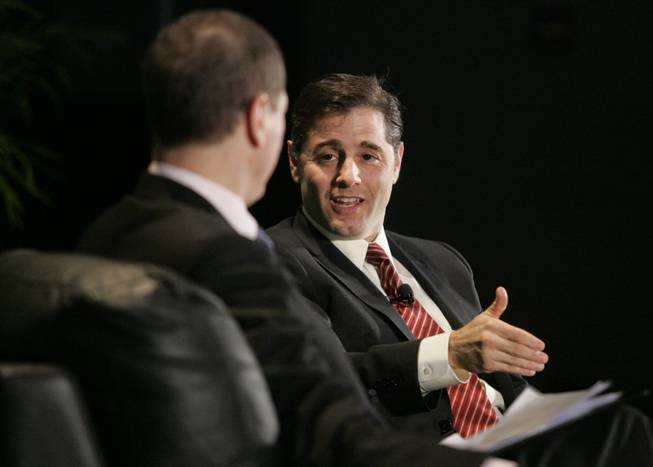
Sam Morris / Las Vegas Sun
FCC Chairman Julius Genachowski answers questions during a one-on-one session at CES Friday, January 8, 2009.
Friday, Jan. 8, 2010 | 4:30 p.m.
Related stories
- Nokia chief at CES: Mobile phones helping many with basics (1-8-2010)
- At CES, Intel chief says fully connected homes on the horizon (1-10-2010)
- Industry working to clear up misconceptions about 3-D television (1-8-2010)
- Consumers want on-demand video, but media companies not delivering (1-8-2010)
- Ford unveils in-vehicle 'Touch' technology at CES (1-7-2010)
- Gadgets and garters: It’s convention in Las Vegas (1-7-2010)
- Puff of air controls new computer mouse (1-7-2010)
- Sony aims to become global leader in 3-D (1-7-2010)
- Microsoft anticipates 'biggest year ever' for the Xbox (1-6-2010)
- Las Vegas braces for 110,000 at Consumer Electronics Show (1-6-2010)
- Consumer Electronics hot ticket: 3-D television (1-6-2010)
- Analysts predict flat electronics sales for 2010 (1-6-2010)
- What others are saying about CES (1-6-2010)
Federal Communications Commission Chairman Julius Genachowski discussed the agency’s plans for nationwide broadband expansion and emphasized the importance of a “free flow of expression” on the Internet during a session Friday at the International Consumer Electronics Show in Las Vegas.
But it’s not just what is available online that the FCC is wrangling with. Under last year's economic stimulus bill, the agency was charged with developing a national broadband plan. It has hosted dozens of public meetings, hearings and workshops to chip out a roadmap for the country's technological future.
"It's something we hope will be a living, breathing, moving plan for the country for many years," Genachowski said.
He offered few details about what the plan would contain, but stressed its importance. The plan would provide guidance not only to the FCC, but to Congress and other government agencies as well as the private sector on how to improve the country's communications infrastructure.
The plan, due to Congress by Feb. 17, likely will be turned in late – on Wednesday, the FCC asked for a one-month extension – but in Genachowski's opinion, the plan is already tardy.
"We should have had a national broadband plan as a country years ago," he said. Many other countries have had such a plan in place for years, he said. The extra 30 days, he said, will give the agency a chance to fine-tune the quality of the voluminous plan.
Genachowski touched on the importance of net neutrality, which aims to prevent phone and cable companies from abusing their control over the market for high-speed Internet access. The federal agency's dispute with cable company Comcast over file sharing made headlines again Friday, as oral arguments were heard in the U.S. Court of Appeals for the District of Columbia Circuit. A decision in the case is expected this spring.
He said the FCC is continuing to invest in the "free flow of expression" and said the agency wants to preserve the "special magic" of the Internet.
"Our hope is that there is an outcome here that preserves a free and open Internet," he said, adding that the FCC must become a "21st century agency."
Each year the Consumer Electronics Association invites the sitting chairman of the FCC to participate in a discussion at the annual CES. 2010 marks Genachowski's first appearance at CES after his appointment by President Obama last year.
At CES in 2009, the focus of CEA President and CEO Gary Shapiro's conversation with then-outgoing FCC Chairman Kevin Martin was the transition to digital television.
Genachowski acknowledged the success of that transition, saying that working with private-sector partners would continue to be important when making big changes to the country's technological infrastructure.
"Thinking creatively about public-private partnerships has to be part of what we do," he said, adding that fleshing out the nation's broadband network will require substantial investment in infrastructure.
An overwhelming amount of that investment will come from the private sector, he said.
Genachowski loosely mentioned a few of the upsides of expanding broadband access – notably, he referred to the evolution of job-seeking and said that in the current economic climate, a large number of jobs are only posted online.
Not only is access to the Internet important for finding a job, but digital skills are becoming increasingly essential, he said, adding that America's commitment to literacy skills and the idea that all children must know how to read should be extended to digital literacy and computer skills.
In his hour-long talk, Genachowski also discussed the V-Chip (he says private sector innovation could render it obsolete), the wireless spectrum (he sees a "looming crisis"), citizen involvement (he wants the FCC to put continued resources into developing databases of records available to the public) and broadening the media landscape (public safety communication networks for first responders need improving).
He also offered brief thoughts on the Fairness Doctrine, an FCC policy that required broadcasters to present both sides of issues of public importance.
"It's dead," he said. The policy was abandoned in the 1980s, but some legislators have toyed with the idea of reinstating it.
Being on the floor at CES, he said, further confirmed for him that the broadband plan is essential for America's future.
"Investment in the free-flow of expression … those goals are as important as ever," he said.
Genachowski was sworn in as FCC chairman in June. A classmate of Obama's from Harvard law school, Genachowski worked previously for the FCC as Chief Counsel to FCC Chairman Reed Hundt.

Join the Discussion:
Check this out for a full explanation of our conversion to the LiveFyre commenting system and instructions on how to sign up for an account.
Full comments policy